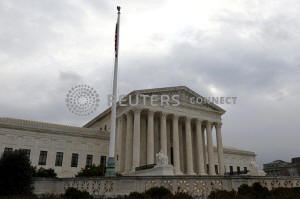A U.S. Supreme Court first: arguments by teleconference including major
one involving Trump
 Send a link to a friend
Send a link to a friend
 [April 14, 2020]
By Lawrence Hurley and Andrew Chung [April 14, 2020]
By Lawrence Hurley and Andrew Chung
WASHINGTON (Reuters) - The U.S. Supreme
Court said on Monday that for the first time it will hear cases argued
by teleconference rather than in the courtroom due to the coronavirus
pandemic including a dispute over whether President Donald Trump's tax
and financial records should be disclosed.
The announcement represented the latest way the pandemic has forced
changes in American society, with the nine justices set to embrace
teleconferencing like countless other shuttered workplaces that have
struggled to continue functioning.
The court will hear arguments next month by teleconference in 10 cases,
with the justices and lawyers for the litigants set to participate
remotely in light of "public health guidance" in response to the
pandemic, court spokeswoman Kathy Arberg said.

In another break with tradition, the court will provide a live audio
feed of the arguments to the news media. Cable TV network C-SPAN said it
plans to broadcast that feed in all the cases.
The court historically has resisted new technologies. Audio feeds in the
past have not been broadcast live. There still is no video recording of
arguments.
The court will hear arguments on May 4, 5, 6, 11, 12 and 13. It did not
announce the dates for the individual cases.
"The court building remains open for official business, but most court
personnel are teleworking. The court building remains closed to the
public until further notice," Arberg said.
Trump's appeals in three separate cases to prevent his financial records
from being handed over to Democratic-led U.S. House of Representatives
committees and a New York prosecutor were due to have been heard on
March 31 but were postponed on March 16 when the court delayed a series
of cases over coronavirus concerns.
"We are pleased that the court will hear arguments this term," said Jay
Sekulow, a personal lawyer for Trump.
Another case focuses on the complex U.S. presidential election system
and whether Electoral College electors are free to break their pledges
to back the candidate who wins their state's popular vote.
"When you argue in person, you have a better understanding of what is
being understood by the court," said Lawrence Lessig, a lawyer in that
case. "It's about being in the same room and watching the reactions of
the justices."
[to top of second column]
|

The building of the U.S. Supreme Court is pictured in Washington,
U.S., March 18, 2019. REUTERS/Erin Scott/File Photo

Other cases to be argued by teleconference include a religious
rights dispute involving Catholic schools in California and a Trump
administration bid to let employers obtain religious exemptions from
having any health insurance offered to employees pay for women's
birth control.
The justices traditionally issue all pending rulings by the end of
June before taking a summer recess. But rulings potentially could be
delayed because of the coronavirus disruptions.
TRUMP'S RECORDS CASES
The Republican president lost in lower courts in the three cases
involving his quest to keep his finances secret. Two involve Trump's
efforts to stave off congressional subpoenas issued to third parties
- his accounting firm Mazars LLP and two banks, Deutsche Bank AG and
Capital One Financial Corp - demanding his bank records, tax returns
and other material.
The other case involves a criminal investigation into Trump and his
family real estate business in which Manhattan's district attorney
is seeking the president's tax returns.
One major case left off the May arguments schedule was Google's bid
to escape Oracle Corp's multi-billion dollar lawsuit over software
copyrights, which now is expected to be heard in the court's next
term that begins in October.

The coronavirus has proven to be particularly dangerous in elderly
people, especially those with underlying medical issues. Three of
the nine justices are over age 70: Ruth Bader Ginsburg (87), Stephen
Breyer (81) and Clarence Thomas (71).
House Speaker Nancy Pelosi and Senate Majority Leader Mitch
McConnell so far have resisted calls from lawmakers in both parties
to allow remote voting in Congress amid the coronavirus crisis.
(Reporting by Andrew Chung in New York and Lawrence Hurley in
Washington; Additional reporting by Susan Cornwell, Jonathan Stempel
and Karen Freifeld; Editing by Will Dunham)
[© 2020 Thomson Reuters. All rights
reserved.] Copyright 2020 Reuters. All rights reserved. This material may not be published,
broadcast, rewritten or redistributed.
Thompson Reuters is solely responsible for this content. |